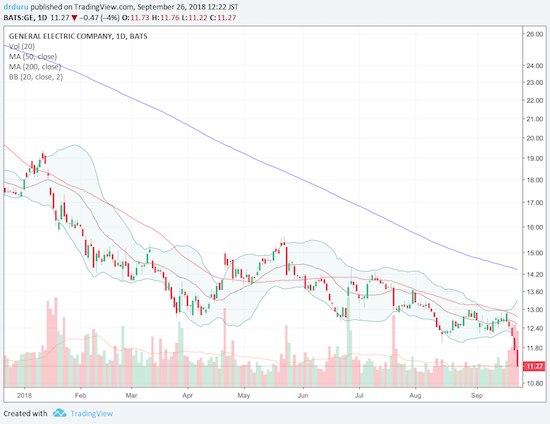General Electric (GE) dropped 4.0% for a fourth straight day of high volume selling. At $11.27/share GE sits at a stomach-churning 9-year low.

Source: TradingView
GE’s early June expulsion from the Dow Jones Industrial Index seemed like such natural ignition for a bottom that even CNBC’s Jim Cramer got off the fence to declare the stock a buy. At the time I proposed a lower risk method of playing a potential bottom using call options. The call option configuration certainly helped ease the pain of the recent 9-year lows. Still, with selling accelerating, the temptation to consider the conditions for a bottom is too great to resist. Sure enough, Guy Adami on Fast Money offered his keys for determining whether GE (or any stock) has indeed finally reached bottom:
- A new 52-week low on heavy [trading] volume: this action can indicate a wash-out of sellers.
- Management is up-front and addressing the problems with the business: hope remains the company figure things out.
- The company remains in a viable industry: the business and economic environment still gives the company time to turn things around.
If GE's drop makes you want to buy the dip, @GuyAdami has tips on when to catch a falling knife. $GE pic.twitter.com/a8mvRTdH7p
— CNBC's Fast Money (@CNBCFastMoney) September 25, 2018
I like Adami’s points. However, the title “how to catch a falling knife” is telling. Traders and investors should not actually reach out to catch a falling knife. Instead, they should step in when the risk of catching a knife is sufficiently low to make the risk worthwhile. In other words, I prefer to wait for “confirmation” that the falling knife has finished falling; I want the ground to catch the knife, not me.
Two years ago, I described this confirmation process in a piece titled “Do Not Argue With Sellers – Celebrate With Buyers.” When sellers have firm control of a stock, I want to wait for some sign of buying – like a trading day with a gain. A stronger confirmation occurs after buyers manage to establish control of the trading with a complete reversal of the most concentrated part of the sell-off. My only rare exception to the confirmation rule occurs when I have a strong conviction from some data or analysis that puts me in accumulation mode.
In the case of GE, a close above $11.80 would deliver the first potential sign of a washout and exhaustion of sellers. A close above $12.71 would signal high odds of a complete washout. Since I already have a position in play, I am content to wait for this more definitive confirmation. Shorter-term traders should stop out of their long positions if GE manages to close below the latest low of $11.27. If GE closes at fresh lows, then the first signal of seller’s exhaustion adjusts downward to whatever closing price clears the intraday high of the last day of high-volume selling.
GE will continue to capture the imagination given its iconic status as a symbol of America’s industrial past. Now we wonder whether the future is waiting for GE as it sinks in stark contrast to the strength of the American economy and the near relentless up-trend of the S&P 500 (SPY).
Be careful out there!
Full disclosure: long GE call options
